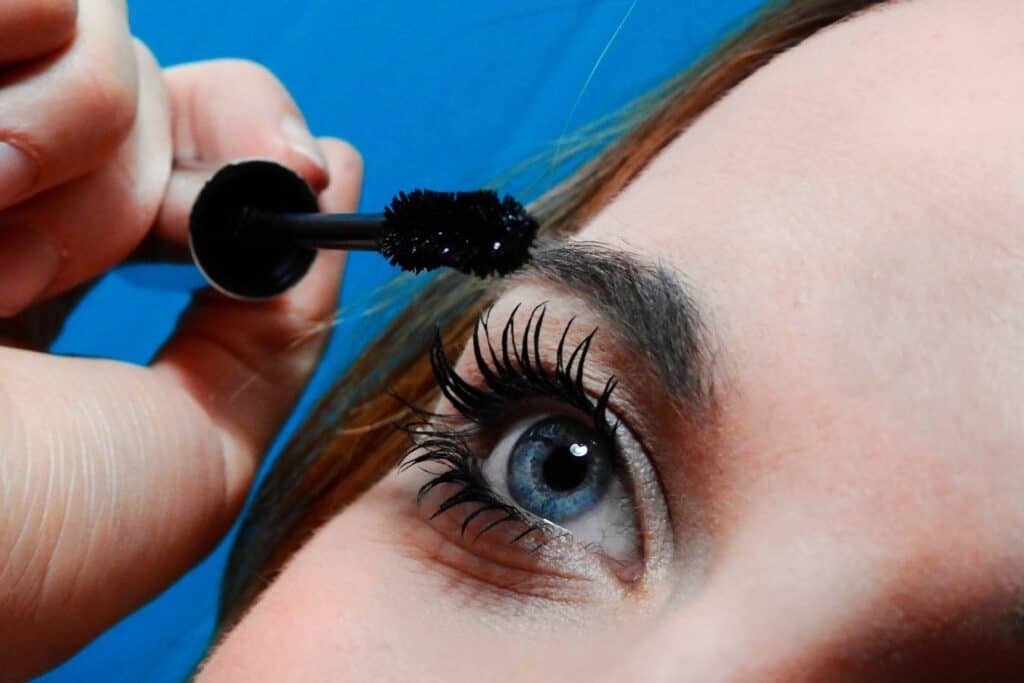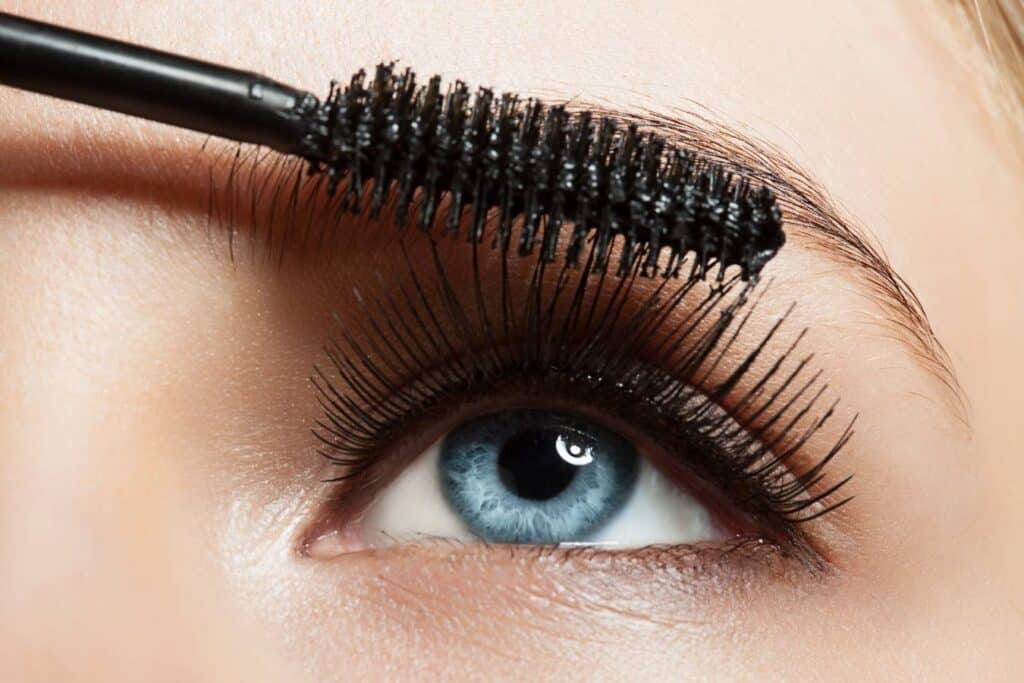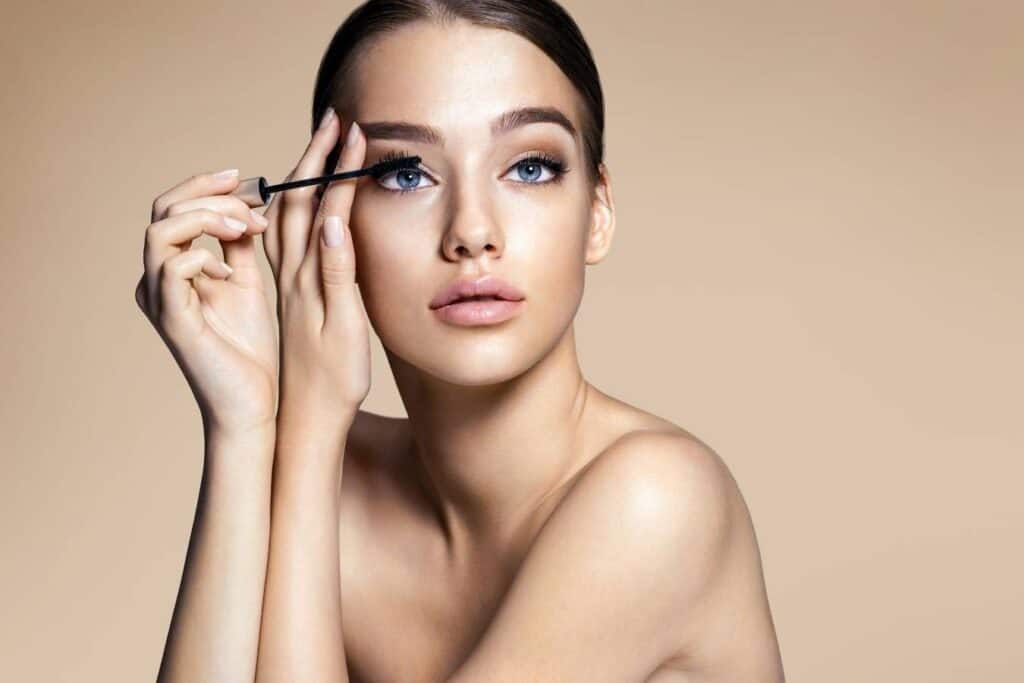Mascara is worn by millions of people every single day and can transform your eyes in a second. But is mascara good for your eyelashes? Let’s take a look.

Mascara in and of itself is not bad for eyelashes, providing you follow a few simple rules:
- Choose a natural, conditioning, and/or hypoallergenic mascara.
- Only wear waterproof mascara for special occasions.
- Don’t apply multiple coats of mascara every day
- Remove gently to avoid lash loss and damage.
- Always remove mascara before bed.
- Replace your mascara every three months.
Benefits of Mascara
Depending on the brand and the type of mascara you purchase, mascara has a number of benefits.
These include:
- Adding color to the lashes
- Creating definition and drawing attention to the eyes
- Curling and opening your lashes, giving you a more ‘wide awake’ look
- Can add volume and thickness to sparse or thin lashes
- Can lengthen short lashes
- Conditioning mascaras can help keep your lashes nourished and healthy
Is Mascara Good For Eyelashes?

To answer this question, there are a few factors to take into account. These are detailed below:
1. The Type You Buy
Avoid mascara that is full of chemicals like petroleum, colorants, preservatives, and fragrances as these can cause irritation and allergies. Some ingredients to watch out for include:
- Butylated hydroxyanisole (BHA) or butylated hydroxytoluene (BHT)
- Coal tar dyes
- Formaldehyde
- Parabens
- Fragrances
- Polyethylene glycols, or PEG compounds
- Petrolatum or petroleum jelly
Mascaras with natural ingredients can be much safer for your eyes and lashes, but they will also be more expensive.
At the very least, look for a brand that is hypoallergenic and contains moisturizers or lash conditioners.
These will help reduce irritation and care for your eyelashes.
Only wear waterproof mascara for special occasions.
This is because the waterproof formula makes it more difficult to remove, which can result in increased lash loss during the removal process.
2. How You Apply It
Don’t be tempted to pump the mascara wand inside the tube when applying as this can force air inside the tube, which can cause bacteria to multiply.
Also, try to resist the urge to put on lashings of mascara every day.
While it’s okay to put a few coats on for a special occasion, doing this every day will make the mascara much more difficult to remove, resulting in increased lash loss and breakages.
3. How Often You Replace It
Bacteria can build up in mascara; after all, the wand is going on your eyelashes every day and then back in the tube without being cleaned.
It is recommended that you replace your mascara every three months to avoid the risk of eye infections such as pink eyes and styes.
4. How You Remove It
It’s important to be gentle when removing any eye makeup.
- Use a cotton pad soaked in a suitable cleanser such as eye makeup remover or coconut oil.
- Press to your eyelid and hold for 20 seconds.
- This will give time for the cleanser to break down the mascara, making it easier to remove.
- Then wipe away the mascara with gentle downward strokes.
- Being too rough or vigorous can result in lash loss, and cause wrinkles to form around the eyes over time.
Always remove your mascara before bed, as not doing so can cause your lashes to become weaker and more brittle, and flakes of mascara can get into your eyes.
Should You Use Mascara On Eyelashes?
It is entirely up to you.
Mascara should be safe to use on your eyelashes, so long as you remember the following factors when making your decision:
- Choose a natural or hypoallergenic product, especially one with lash moisturizers or conditioners.
- Only wear waterproof mascara for special occasions.
- Applying multiple coats will make mascara harder to remove, which may result in lash loss or damage.
- Remove mascara gently to avoid lash breakage and loss.
- Always remove mascara before bed.
- Replace your mascara every three months.
- Don’t use if you have an eye infection or a stye
Can Mascara Help Grow Eyelashes?

Some mascaras do contain growth-enhancing ingredients. You might end up spending a little more, but it’s worth it if you love mascara and want longer, thicker lashes.
Always choose a mascara with natural and/or hypoallergenic, lash conditioning ingredients, and follow a good lash care routine which includes removing your makeup before bed.
These mascaras for short and thin lashes may help.
How To Use Mascara For Eyelashes
- Curl your lashes if you like, to help lift and lengthen them.
- You can also use a primer to help thicken and separate your lashes, and provide a smooth surface for your mascara.
- Take your favorite mascara. Twist the wand as you remove it from the tube and wipe off any excess at the edge of the tube. Doing so will help avoid clumping.
- Apply your mascara to the upper lashes. Start at the root and work your way towards the tip, wiggling the wand back and forth as you go to capture all the lashes. Slowly blink downwards onto the wand as you apply to help avoid smudges and add volume to your lashes.
- Wait for the first coat to dry if you want to add a second layer.
- Now apply to the lower lashes using just the tip of the wand to avoid clumping. Move the bristles back and forth to capture all the lashes.
- Use the wand vertically or diagonally to grab the small, hard-to-reach lashes at the corners of your eyes.
Risks And Warnings Of Using Mascara
Always be careful when applying mascara not to poke yourself in the eye with the wand. Doing so could result in eye injury.
Don’t use mascara when sleeping and avoid using it after treatments on your face such as lash lifts for at least 24 hours.
Replace your mascara every three months and never share it with another person.
Doing so could result in the spread of bacteria, resulting in a potential eye infection. You should therefore refrain from using mascara if you have a stye.
Wearing mascara before, during, and after LASIK eye surgery should also be avoided.
If you experience any irritation or an allergic reaction after using mascara, such as swelling, itchy eyes, stinging or a red rash, immediately remove the product from your eyes and discontinue use.
